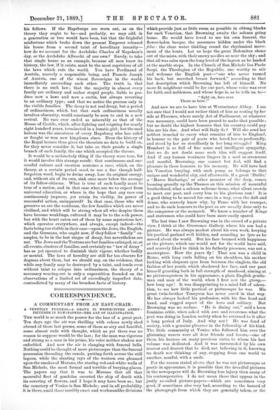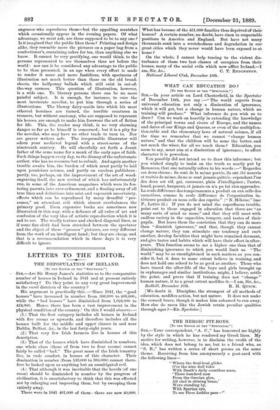CO RRESPONDEN CE.
A COMMENTARY FROM AN EASY-CHAIR:
A VENETIAN FUNERAL-A GRAVE IN WESTMINSTER ABBEY-
PICTURES IN NEWSPAPERS-THE ART or ILLUSTRATION.
'THE world is so much the poorer for the loss of a great poet. Ten days ago the air was thrilling with echoes newly shed .abroad of those last poems, some of them so airy and fanciful, -some almost rude with thought, which as yet there was no reason to suppose would be the last; for the man was vigorous -and strong as a man in his prime, his voice neither shaken nor enfeebled. And now the air is clanging with funeral bells. Nothing could be thought of more picturesque than the funeral procession threading the canals, putting forth across the still lagoon, while the slanting rays of the western sun gleamed upon the smokes of Murano, the staring red-and-white walls of San Michele, the most formal and terrible of burying-places. The papers say that it was to Murano that all that mournful fleet of gondolas escorted the ship of death with its covering of flowers, and I hope it may have been so ; but the cemetery of Venice is San Michele ; and in all probability it is there, amid those terribly exact and workmanlike divisions which provide just as little room as possible in oblong blocks for each Venetian, that Browning awaits the solemn going home. He would have loved to see his own funeral, the flower-laden barque, the mourners hidden under the black felze : the clear water tinkling round the rhythmical move- ment of the boats. Let us hope the great Dolomites shone out of the mists, with their snowy needles so near the sky ; and that all was calm upon the long level of the lagoon as he landed at the marble steps. In the Church of San Michele lies Paolo Sat-pi, the Theologian of the Republic, one worthy to stir and welcome the English poet—" one who never turned his back, but marched breast forward," according to that last description which Browning has left of himself. No more fit neighbour could be for our poet, whose voice was ever for faith and nobleness, and whose hope is, as he tells us, to— "fight on, fare ever There as here !"
And now we are to have him at Westminster Abbey. I am not sure that I would not rather think of him as resting by her side at Florence, where surely Act of Parliament, or whatever was necessary, could have been passed to make that possible ; but no doubt the highest honours that his country could pay him are his due. And what will Italy do ? Will she send her noblest ironclad to carry what remains of him to England, in honour to the pair of poets who loved her so profoundly, and stood by her so steadfastly in her long struggle? King Humbert is so full of fine sense and intelligent sympathy, that we do not doubt some such idea will suggest itself. And if any human weakness lingers in a soul so strenuous and manful, Browning, one cannot but feel, will find a pleasure in these honours to his memory. He will have had his Venetian burying, with such pomp as belongs to that unique and wonderful city, and afterwards, if a great `Duilio,' a Marco Barbarigo,' or other monster of the deep, comes looming grandly up the Thames on this mission of mournful brotherhood, what a solemn welcome home, what silent crowds to meet our poet, and carry him to his glorious rest ! It is a good thing to be moved for once in a way, even the dull and dense, who scarcely know why, by Fame with her trumpet, and to do such honours to the poet as are usually done only to the conqueror or the monarch. We know a number of Kings and statesmen who could have been more easily spared.
The last time I saw Browning was in the crowd of a private view, I think at the Grosvenor Gallery, where his son had a picture. He was always modest about his own work, keeping his poetical garland well hidden, and sounding no lyre as he moved about the world. But his face beamed with happiness at the picture, which one would not for the world have said, and scarcely liked to think in his fatherly presence, was not a masterpiece. How the years fly ! That son was a child in Rome, with long curls falling on his shoulders, his mother looking with eloquent eyes from between the ringlets, the old fashion of her youth, which shadowed her face, and our poet himself guarding both in full strength of manhood, aiming at no picturesqueness in his appearance, a plain English gentle- man and man of the world, when I first saw the group,— how long ago ! It was disappointing to a mind full of adora- tion, to see how little poetical or picturesque he was. His great twin-brother Tennyson has never erred in that way. He has always looked his profession, with his fine head and hand, and rugged aspect of the hero and solitary. But Browning was no recluse. "He is dining out," said a keen feminine critic, when asked with awe and reverence what the poet was doing in London society when he returned to it after a long period of Italy. And why not ? He was fond of society, with a genuine pleasure in the fellowship of his kind. The little community at Venice who followed him over the glistening waters were all dear friends and lovers,—one of them his hostess on many previous visits, to whom his last volume was dedicated. And it was surrounded by his own nearest and dearest that he died, not believing in it, knowing no death nor thinking of any, stepping from one world to another, manful, with a smile.
For the reason stated above, that he was not picturesque or poetic in appearance, it is possible that the dreadful pictures in the newspapers will do Browning less injury than many of his contemporaries. I do not mean those that appear in the justly so-called picture-papers—which are sometimes very good, if sometimes also very bad, according to the hazard of the photograph from which they are generally taken, or the engraver-who reproduces them—but- the appalling scratches which occasionally appear in the evening papers. Of what advantage, we must ask, are these supposed to be to any one ? Is it imagined that the public likes them ? Printing and design alike, they resemble more the pictures on a paper bag from a confectioner's, containing cakes for tea, than anything else we know. It cannot be very gratifying, one would think, to the persons represented to see themselves thus set before the world : nor can it be considered any advantage to the public to be thus presented, in an age when every effort is made to render it more and more fastidious, with specimens of illustration not much better than those on the old broad- sheets, the halfpenny ballads which still exist in out-of- the-way corners. This question of illustration, however, is a wide one. To literary persons there can be no more painful subject. It is enough, for instance, to cure the most inveterate novelist, to put him through a series of illustrations. The blowsy dairy-maids into which his most ethereal heroines are turned, the terrible creatures in trousers, but without anatomy, who are supposed to represent his heroes, are enough to make him forswear the art of fiction for life. This, the reader may think, is no very alarming danger so far as he himself is concerned ; but it is a pity for the novelist, who may have no other trade to turn to. Nor are graver writers safe. The irrepressible illustrator will adorn your mediEeval legend with a street-scene of the nineteenth century. He will cheerfully set forth a Jesuit father of the same name for a monk of the early ages of faith. Such things happen every day, to the dismay of the unfortunate author, who has no resource but to submit. And again another trouble awaits him, the burden of which must partly be laid upon pernicious science, and partly on careless publishers : partly, too, perhaps, on the improvement of the art of wood- engraving itself, the new revival of which has unfortunately run, in some of the American magazines which were its fos- tering parents, into over-refinement, and a floating away of all true lines and definitions into mist and vapourish uncertainty, effects which can be reproduced by many dreadful "pro- cesses," an attendant evil which almost overbalances the primary good. Even expensive books are sometimes now illustrated in this way, with a defiance of all rules of art and confusion of the very idea of artistic reproduction which it is sad to see. The woolly texture and checked diagonal lines, as if some fine cloth had been stretched between the spectator and the object of these " process " pictures, are very different from the work of an intelligent hand ; but they are cheap, and that is a recommendation which in these days it is very difficult to ignore.











































 Previous page
Previous page